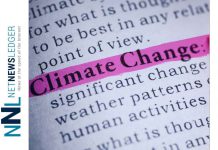At Tuesday’s summit, France will urge wealthy nations to increase climate finance and urge investors to turn their backs on polluters
PARIS – (Reuters) – French President Emmanuel Macron plans to award multi-year grants for several U.S.-based scientists to relocate to France, his office said on Monday on the eve of a climate summit hosted by the president to raise finances to counter global warming.
Macron unveiled the “Make our Planet Great Again” grants after President Donald Trump in June said he was pulling the United States out of an international accord to reduce greenhouse gas emissions that was brokered in Paris in 2015.
Macron repeatedly tried to persuade the U.S. leader to reverse his decision. In a statement, the Elysee Palace said 13 of the initial 18 grants will be awarded to scientists based in the United States.
“You will now settle in, develop projects, enrich French, European research, because we’ve decided to give even bigger resources and to fully recognise what you are doing,” Macron said in a speech at Station F, a start-up incubator in Paris.
Macron was addressing the winners of the grants, some of whom attended his speech. Prominent U.S. universities, including Princeton, Stanford and Harvard, were among those from which the winning researchers were selected, the presidency said.
Macron said in a CBS News interview on Monday the U.S. decision to unilaterally quit the Paris accord had provided an impulse for action by governments and the private sector.
“OK, we have to react and do something, because it’s impossible to leave this all to – a sort of dismantling of the Paris agreement,” he told the U.S. network in Paris.
But he called the withdrawal “extremely aggressive” and said Trump’s offer to renegotiate the accord was not an option.
“I’m not ready to renegotiate, but I’m ready to welcome him if he decides to come back,” Macron said, adding: “I’m pretty sure that my friend President Trump will change his mind in the coming months or years.”
At Tuesday’s summit, Macron will urge wealthy nations to increase climate financing and urge investors to turn their backs on polluters in a bid to accelerate efforts to combat global warming.
French state-controlled utility EDF on Monday said it would invest 25 billion euros to develop 30 gigawatts of solar capacity in France between 2020 and 2035. Daily Newspaper Les Echos quoted the chief executive of Engie, Isabelle Kocher, as saying her company would invest 1 billion euros to improve the energy efficiency of buildings.
Separately, nine European energy companies including EDF, Italy’s Enel, Spain’s Iberdrola SA and Britain’s SSE said they would include green bonds in their financing policies.
Developing nations say that the rich are not on track with a broader commitment in the Paris accord for wealthy economies to provide $100 billion a year by 2020 – from public and private sources alike – to help developing countries switch from fossil fuels to greener energy sources and adapt to the effects of climate change.
Oxfam estimated that there was only between $4 billion and $8 billion available for adaptation and that recent estimates showed the cost of helping emerging nations deal with rising sea levels, droughts, flooding and other effects of global warming could add up to $140 billion to $300 billion per year by 2030.
“Right now, the world’s poorest people are getting only a tiny fraction of the help they desperately need to survive,” Oxfam said in a statement.
“This year’s barrage of climate disasters showed that poor communities are often completely unprepared to deal with extreme weather.”
($1 = 0.8487 euros)
(Reporting by Jean-Baptiste Vey; Additional reporting by Mathieu Rosemain; Writing by Richard Lough; Editing by James Dalgleish and Lisa Shumaker)






